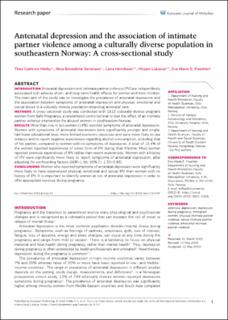| dc.contributor.author | Melby, Thea Cathrine | |
| dc.contributor.author | Sørensen, Nina Benedicte | |
| dc.contributor.author | Henriksen, Lena | |
| dc.contributor.author | Lukasse, Mirjam | |
| dc.contributor.author | Flaathen, Eva Marie | |
| dc.date.accessioned | 2023-02-24T11:31:58Z | |
| dc.date.available | 2023-02-24T11:31:58Z | |
| dc.date.created | 2022-08-16T13:07:35Z | |
| dc.date.issued | 2022 | |
| dc.identifier.citation | European Journal of Midwifery. 2022, 6 (July), 1-10. | en_US |
| dc.identifier.issn | 2585-2906 | |
| dc.identifier.uri | https://hdl.handle.net/11250/3053826 | |
| dc.description.abstract | Introduction: Antenatal depression and intimate partner violence (IPV) are independently associated with adverse short- and long-term health effects for women and their children. The main aim of the study was to investigate the prevalence of antenatal depression and the association between symptoms of antenatal depression and physical, emotional and sexual abuse in a culturally diverse population attending antenatal care. Methods: A cross-sectional study was conducted with 1812 culturally diverse pregnant women from Safe Pregnancy, a randomized controlled trial to test the effect of an intimate partner violence intervention for abused women in southeastern Norway. Results: More than one in ten women (14%) reported symptoms of antenatal depression. Women with symptoms of antenatal depression were significantly younger and single, had lower educational level, more limited economic resources and were more likely to use tobacco and to report negative experiences regarding alcohol consumption, including that of her partner, compared to women with no symptoms of depression. A total of 15.4% of the women reported experiences of some form of IPV during their lifetime. Most women reported previous experiences of IPV rather than recent experiences. Women with a history of IPV were significantly more likely to report symptoms of antenatal depression, after adjusting for confounding factors (AOR=1.96; 95% CI: 1.35–2.83). Conclusions: Women who reported symptoms of antenatal depression were significantly more likely to have experienced physical, emotional and sexual IPV than women with no history of IPV. It is important to identify women at risk of antenatal depression in order to offer appropriate services during pregnancy. | en_US |
| dc.language.iso | eng | en_US |
| dc.rights | Navngivelse 4.0 Internasjonal | * |
| dc.rights.uri | http://creativecommons.org/licenses/by/4.0/deed.no | * |
| dc.title | Antenatal depression and the association of intimate partner violence among a culturally diverse population in southeastern Norway: A cross-sectional study | en_US |
| dc.type | Peer reviewed | en_US |
| dc.type | Journal article | en_US |
| dc.description.version | publishedVersion | en_US |
| cristin.ispublished | true | |
| cristin.fulltext | postprint | |
| cristin.qualitycode | 1 | |
| dc.identifier.doi | 10.18332/ejm/150009 | |
| dc.identifier.cristin | 2043394 | |
| dc.source.journal | European Journal of Midwifery | en_US |
| dc.source.volume | 6 | en_US |
| dc.source.issue | July | en_US |
| dc.source.pagenumber | 1-10 | en_US |

